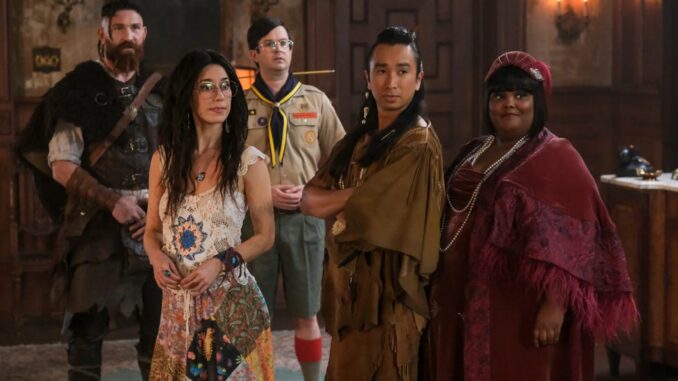
The digital ether can be a peculiar place, a whisper chamber where monumental events pass by unnoticed, and quiet decisions ripple with unintended meaning. So it was, we are told, when a new series of a familiar old friend, re-imagined and re-cast, simply materialised on a UK streaming platform. No fanfare, no grand pronouncements from the BBC mothership, just a stealthy drop, like a parcel left on a doorstep in the dead of night. This unceremonious arrival of a divisive remake of a beloved BBC sitcom speaks volumes, illuminating the complex, often fraught, relationship between nostalgia, cultural evolution, and the perilous art of revival.
Let us first recall the original. Picture it: a Saturday evening, the aroma of a brewing cuppa, the comforting glow of the television. For decades, BBC sitcoms were more than just entertainment; they were a shared cultural shorthand, a national comfort blanket. Think of the crackle of Porridge's prison banter, the endearing chaos of Only Fools and Horses, or the meticulous madness of Fawlty Towers. These shows etched themselves into the collective consciousness, their characters becoming honorary members of the family, their catchphrases embedded in the linguistic bedrock. They represented a golden age of British comedy, a blend of sharp writing, unforgettable performances, and a unique ability to capture the quirks and contradictions of the British character. To touch such a cherished relic is not merely to adapt a script; it is to tamper with a sacred cow, to risk offending a cultural catechism held dear by millions.
Then came the first whispers of a remake. In an age dominated by intellectual property and the endless hunt for marketable brands, it was perhaps inevitable. Yet, the initial announcement alone was enough to ignite a firestorm. For many, it felt like sacrilege, a clumsy attempt to 'modernise' something that was perfect in its vintage, like daubing graffiti on a masterpiece. The inherent divisiveness lay not just in the concept, but in the perceived intent. Was it a genuine artistic re-interpretation, or merely a cynical cash-grab, an attempt to leverage existing goodwill without understanding the magic that created it? When details emerged – whispers of updated characters, changed settings, a shift in comedic tone to align with contemporary sensibilities – the outrage often crescendoed into hysterical condemnation even before a single frame was aired. "They'll ruin it," was the common lament, a pre-emptive strike against perceived betrayal.
So, when the new series finally landed, its quiet debut was perhaps the most telling aspect of the entire venture. This was no triumphant return, no prime-time slot with accompanying media blitz. Instead, it was a soft launch, almost a test balloon, whispered into the digital ether. What does such a quiet drop signify? It could be a tacit admission of uncertainty, a recognition that the project itself was fraught with peril and best kept out of the harsh glare of public scrutiny until its reception could be gauged. It could be an acknowledgment of the original's unassailable peak, a humility that understands no remake could ever truly compete with the enshrined memory. Or, more cynically, it might have been a strategic manoeuvre: to avoid the immediate, overwhelming backlash that a high-profile launch would guarantee, allowing it to find its feet, however tentatively, among a self-selecting audience on a streaming platform, away from the traditional broadcast arena where a critical mass of nostalgic viewers might immediately revolt.
The quiet drop on a UK streamer also highlights the shifting landscape of television consumption. No longer are audiences beholden to fixed schedules or limited channels. Streaming platforms offer a boundless ocean of content, where even a new series of a beloved show can become a single, unheralded ripple. This environment allows for niche audiences, for programmes that might not survive the gauntlet of mainstream expectation. Yet, it also means that the collective cultural experience of watching a new series unfold simultaneously, a shared national event, is diminished. The remake, in its quiet corner of the digital world, becomes an isolated experiment, divorced from the communal warmth that defined its predecessor.
Ultimately, the divisive remake, quietly dropped, is a microcosm of our relationship with the past. We crave the comfort of nostalgia, the familiar embrace of what once was. Yet, we live in a constantly evolving present, where humour, social norms, and even the very fabric of society shift. To reanimate a classic is a Sisyphean task: to keep its essence while updating its form, to make it relevant without stripping its soul. Often, the result is neither old nor new, but an uncanny valley of recognition and discomfort. The quiet launch is a gesture of surrender to this inherent futility, an admission that some ghosts are best left in their unquiet graves, their legacy preserved by memory rather than diluted by well-meaning, yet ultimately divisive, modern attempts at reanimation. It is a sombre reminder that while we can always re-watch the classics, we can rarely, if ever, truly remake them.